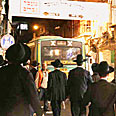
High Court: No sidewalk gender segregation
Judges forbid separation between men, women in Jerusalem's Mea Shearim, allows women to march in haredi neighborhood in protest of discrimination. Ruling 'step in struggle to ensure public space open to all,' petitioner says
The High Court of Justice on Tuesday ruled against separation between men and women on the sidewalks of Jerusalem's haredi Mea Shearim neighborhood. The court also disallowed the positioning of "modesty guards" from the neighborhood committee to enforce the separation.
In addition, the court ruled, women will be allowed to hold a protest march in the neighborhood on Wednesday in protest of the discrimination between men and women. The Jerusalem Police was ordered to allow and guard the procession.
The court was asked to address the issue after extremists in the area tried to illegally enforce separation between men and women during Sukkot.
About a fortnight ago, the Eda Haredit faction proposed blocking Mea Shearim's Mordechai Street to women to prevent men from being near them, but following protest from women's organizations and police demands, the leaders of the community said the road would not be blocked to women.
On Monday, two City Council members petitioned the High Court on the issue. Their representative, Attorney Aviad Hacohen, said that despite assurances from the Eda Haredit, screens to separate men from women had been set up and "guards" positioned to enforce the separation.
The State, in its response Tuesday morning, said there was no place for "pirate" separation in public spaces such as streets, and promised it would prevent this and forbid "guards" from operating in the area. The court accepted the State's announcement, which supports the petitioners.
'Men get entire street'
Jerusalem City Council member Rachel Azaria (Tnuat Yerushalmim) said the court's ruling meant there should be no separation in any public space in the State of Israel. "Any such separation is illegal," she said, "which means that all sorts of unspoken agreements made with the haredi community will not happen again. This is another stage in the struggle to ensure that public space in Israel is open to men and women alike, just like the struggle against separation on buses."
The petition was submitted by ELLA-Israeli Feminist Group, Azaria and Laura Wharton (Meretz), who is also a Jerusalem City Council member. They demanded the police stop the separation immediately throughout Jerusalem and especially in Mea Shearim, protesting police lethargy in acting against it.
The two petitioners related their own experience when they tried to pass the road in a mixed group. "The women were asked to go to a narrow sidewalk, which hardly had space to pass," they said. "The men were given the center, with the entire width of the road."
When they refused, they said, they were physically and verbally assaulted until they left. At the time, they said, police were present but did nothing.
Ronen Medzini contributed to this report
- Follow Ynetnews on Facebook










